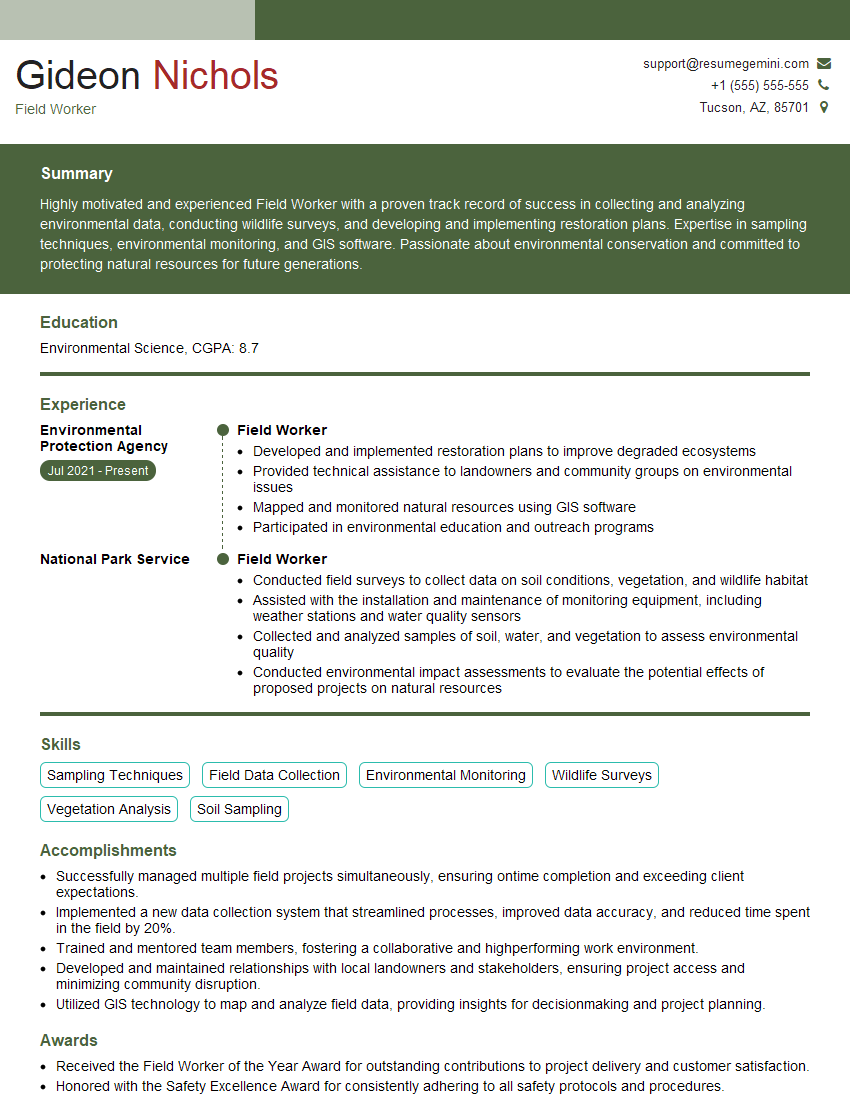Are you a seasoned Field Worker seeking a new career path? Discover our professionally built Field Worker Resume Template. This time-saving tool provides a solid foundation for your job search. Simply click “Edit Resume” to customize it with your unique experiences and achievements. Customize fonts and colors to match your personal style and increase your chances of landing your dream job. Explore more Resume Templates for additional options.

Gideon Nichols
Field Worker
Summary
Highly motivated and experienced Field Worker with a proven track record of success in collecting and analyzing environmental data, conducting wildlife surveys, and developing and implementing restoration plans. Expertise in sampling techniques, environmental monitoring, and GIS software. Passionate about environmental conservation and committed to protecting natural resources for future generations.
Education
Environmental Science
June 2017
Skills
- Sampling Techniques
- Field Data Collection
- Environmental Monitoring
- Wildlife Surveys
- Vegetation Analysis
- Soil Sampling
Work Experience
Field Worker
- Developed and implemented restoration plans to improve degraded ecosystems
- Provided technical assistance to landowners and community groups on environmental issues
- Mapped and monitored natural resources using GIS software
- Participated in environmental education and outreach programs
Field Worker
- Conducted field surveys to collect data on soil conditions, vegetation, and wildlife habitat
- Assisted with the installation and maintenance of monitoring equipment, including weather stations and water quality sensors
- Collected and analyzed samples of soil, water, and vegetation to assess environmental quality
- Conducted environmental impact assessments to evaluate the potential effects of proposed projects on natural resources
Accomplishments
- Successfully managed multiple field projects simultaneously, ensuring ontime completion and exceeding client expectations.
- Implemented a new data collection system that streamlined processes, improved data accuracy, and reduced time spent in the field by 20%.
- Trained and mentored team members, fostering a collaborative and highperforming work environment.
- Developed and maintained relationships with local landowners and stakeholders, ensuring project access and minimizing community disruption.
- Utilized GIS technology to map and analyze field data, providing insights for decisionmaking and project planning.
Awards
- Received the Field Worker of the Year Award for outstanding contributions to project delivery and customer satisfaction.
- Honored with the Safety Excellence Award for consistently adhering to all safety protocols and procedures.
- Recognized with the Field Innovation Award for developing and implementing novel solutions to improve field operations.
Certificates
- Certified Sampling Technician (CST)
- Certified Environmental Monitor (CEM)
- Certified Wildlife Biologist (CWB)
- Certified Erosion Control Specialist (CECS)
Career Expert Tips:
- Select the ideal resume template to showcase your professional experience effectively.
- Master the art of resume writing to highlight your unique qualifications and achievements.
- Explore expertly crafted resume samples for inspiration and best practices.
- Build your best resume for free this new year with ResumeGemini. Enjoy exclusive discounts on ATS optimized resume templates.
How To Write Resume For Field Worker
- Highlight your experience in field data collection and analysis, particularly in soil sampling and wildlife surveys.
- Quantify your accomplishments whenever possible, using specific metrics to demonstrate your impact.
- Showcase your knowledge of environmental regulations and your commitment to environmental stewardship.
- Include relevant certifications, such as the Certified Environmental Professional (CEP) or the Society of Wetland Scientists Professional Wetland Scientist (PWS) certification.
Essential Experience Highlights for a Strong Field Worker Resume
- Conduct field surveys to collect data on soil conditions, vegetation, and wildlife habitat
- Assist with the installation and maintenance of monitoring equipment, including weather stations and water quality sensors
- Collect and analyze samples of soil, water, and vegetation to assess environmental quality
- Conduct environmental impact assessments to evaluate the potential effects of proposed projects on natural resources
- Developed and implemented restoration plans to improve degraded ecosystems
- Provided technical assistance to landowners and community groups on environmental issues
- Mapped and monitored natural resources using GIS software
Frequently Asked Questions (FAQ’s) For Field Worker
What are the primary responsibilities of a Field Worker?
Field Workers are responsible for collecting and analyzing environmental data, conducting wildlife surveys, and developing and implementing restoration plans. They also assist with the installation and maintenance of monitoring equipment, provide technical assistance to landowners and community groups, and use GIS software to map and monitor natural resources.
What are the educational requirements for a Field Worker?
A Bachelor’s degree in Environmental Science, Natural Resources, or a related field is typically required to become a Field Worker.
What skills are important for a successful Field Worker?
Field Workers should have strong field data collection and analysis skills, as well as experience in wildlife surveys and habitat assessment. They should also be proficient in the use of GIS software and have a working knowledge of environmental regulations.
What are the career prospects for Field Workers?
Field Workers can advance to positions such as Environmental Specialist, Project Manager, or Conservation Officer. With additional education and experience, they may also qualify for roles in environmental consulting or academia.
What is the average salary for a Field Worker?
The average salary for a Field Worker in the United States is around $50,000 per year.
What are the benefits of working as a Field Worker?
Field Workers enjoy the opportunity to work outdoors, contribute to environmental conservation, and make a difference in their communities.
What are the challenges of working as a Field Worker?
Field Workers may face challenges such as working in remote locations, dealing with inclement weather, and encountering potentially hazardous wildlife.